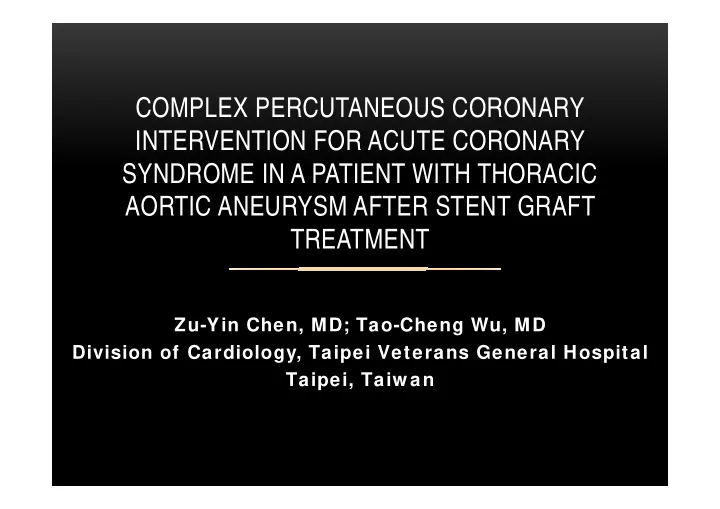

COMPLEX PERCUTANEOUS CORONARY INTERVENTION FOR ACUTE CORONARY INTERVENTION FOR ACUTE CORONARY SYNDROME IN A PATIENT WITH THORACIC AORTIC ANEURYSM AFTER STENT GRAFT AORTIC ANEURYSM AFTER STENT GRAFT TREATMENT Zu-Yin Chen, MD; Tao-Cheng Wu, MD Division of Cardiology, Taipei Veterans General Hospital Taipei, Taiw an
PATIENT HISTORY • 93 y/o man, history of HTN and thoracic aortic aneurysm dissection, about 10 years ago • Poorly controlled BP for two days • Descending thoracic aorta with mural thrombus, measuring Descending thoracic aorta with mural thrombus, measuring 8.5cm in diameter • DAA Stent graft insertion was performed smoothly DAA Stent graft insertion was performed smoothly
HOWEVER… • Non-ST elevation myocardial infarction with cardiogenic shock occurred after unplanned extubation
AP cranial AP cranial RAO caudal RAO caudal CAG
LAO cranial AP caudal
RCA LAO
DIAGNOSIS • CAD with TVD and LM disease • LM bifurcation Medina 1 1 1 • LM bifurcation Medina 1,1,1
TREATMENT PLAN • CABG vs PCI • Family refused CABG y • IABP was placed for support
LM to distal LAD was predilatated LM to distal LAD was predilatated with a Ryujin 2.5 x 20mm balloon with pressure up to 10barr p p A Ryujin 3.0 x 15mm balloon was A Ryujin 3.0 x 15mm balloon was used to predilatate the lesions from distal LCX to proximal LCX p with pressure up to 6barr
DISSECTION • Dissection occurred over LM to proximal LAD and LM t to proximal LCX i l LCX • Cullote stenting
STENT DEPLOYMENT Proximal to mid LAD: Mid to distal part of LAD: p Xience V 2.75 x 28mm Xience V 2.75x28mm
STENT DEPLOYMENT STENT DEPLOYMENT Distal LCX: Mid-LCX: Promus 2.75 x 28mm Xience V 3 x 28mm
CULLOTE STENTING 1 LM to proximal LAD: 1. LM to proximal LAD: 2 LM to proximal LCX: 2. LM to proximal LCX: Xience V 3.0 x 18mm Xience V 3.5 x 23mm
KISSING BALLOON TECHNIQUE • LM to proximal LAD • NC Mercury 3.0 x 20mm y • LM to proximal LCX • NC Voyager 3.5 x 15mm NC Voyager 3 5 x 15mm
FINAL SHOT
• The patient withstood the procedure well and was transferred to critical care unit for further care
CONCLUSION • IABP can be used safely in a patient after thoracic aorta stent deployment • Measures such as adequate sedation during intubation should be performed to avoid unplanned extubation and unnecessary stress
Recommend
More recommend